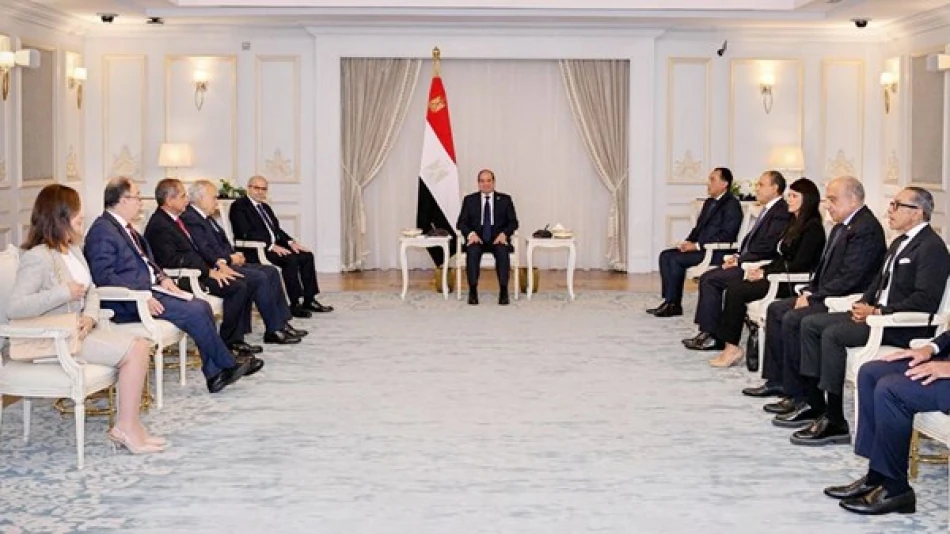
Egypt's Sissi Pledges Support for Lebanon's Stability Efforts
Egypt Emerges as Key Regional Stabilizer as Lebanon Seeks Economic Recovery
Egyptian President Abdel Fattah el-Sisi has pledged comprehensive support for Lebanon's efforts to restore stability and launch economic recovery, signaling Cairo's growing role as a regional anchor amid Middle Eastern turbulence. The commitment came during Lebanese Prime Minister Nawaf Salam's first official visit to Egypt since assuming office, highlighting the strategic importance both nations place on bilateral cooperation during Lebanon's fragile transition period.
Strategic Timing of High-Level Diplomacy
Salam's inaugural visit to Cairo carries significant weight, coming at a critical juncture when Lebanon's government is working to reassert state authority across its territory and rebuild institutional credibility. The timing reflects Lebanon's urgent need for regional allies as it navigates complex domestic challenges while managing external pressures.
During Wednesday's meeting, attended by Egyptian Prime Minister Mostafa Madbouly, el-Sisi praised the positive steps taken by Lebanon's government in recent months to restore institutional order and extend state control throughout Lebanese territory. This acknowledgment suggests Egypt views Lebanon's current leadership as a credible partner capable of delivering on commitments.
Egypt's Calculated Regional Investment
Beyond Rhetoric: Institutional Support Framework
El-Sisi's emphasis on supporting Lebanese state institutions, particularly the military, reveals Egypt's strategic approach to regional stability. By focusing on institutional capacity-building rather than merely offering financial aid, Cairo positions itself as a long-term partner invested in Lebanon's structural recovery.
The Egyptian president stressed the necessity of Lebanon's continued efforts to protect its internal stability, national unity, and territorial integrity—language that reflects Egypt's own experience managing domestic challenges while maintaining regional influence.
Diplomatic Leverage and International Coordination
Egypt's intensive communications with international and regional actors regarding Lebanon demonstrates Cairo's growing confidence in its diplomatic capabilities. El-Sisi highlighted Egypt's advocacy for complete Israeli withdrawal from southern Lebanon and international support for Lebanese institutions, positioning Egypt as a bridge between Arab concerns and global stakeholders.
Economic Cooperation Takes Center Stage
The planned tenth session of the Egypt-Lebanon Joint Higher Committee, scheduled for Cairo later this year, represents more than routine diplomatic protocol. For Lebanon, deepening economic ties with Egypt offers access to a larger, more stable market and potential investment opportunities. For Egypt, supporting Lebanon's recovery enhances its regional leadership credentials while potentially opening new trade corridors.
Salam's emphasis on strengthening cooperation with Arab states, with Egypt at the forefront, suggests Lebanon is recalibrating its regional strategy toward greater Arab integration—a shift that could reduce its vulnerability to external manipulation.
Regional Implications and Strategic Calculations
The alignment between Egyptian and Lebanese positions on Gaza developments indicates broader regional coordination among Arab states seeking to present unified positions on key issues. This convergence strengthens both countries' diplomatic leverage while demonstrating the potential for Arab states to coordinate responses to regional crises.
Egypt's support for Lebanon also serves Cairo's broader strategy of establishing itself as the primary Arab mediator in regional conflicts. By backing Lebanon's recovery, Egypt strengthens its position as an indispensable partner for both regional allies and international powers seeking Middle Eastern stability.
The success of this partnership will likely depend on Lebanon's ability to implement meaningful reforms while Egypt maintains consistent support despite its own economic pressures. Both nations face the challenge of translating diplomatic momentum into concrete economic and security cooperation that delivers tangible benefits to their populations.
Most Viewed News

 Layla Al Mansoori
Layla Al Mansoori






